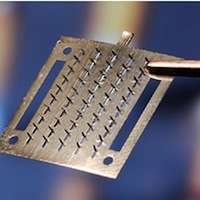Biomedical engineers offer update for blood-sampling process

(Medical Xpress)—Dr. Erwin Berthier studied biomedical engineering because he wanted to change the world. Since he co-founded Tasso, Inc., his dream of making a difference in people's lives is one step closer to reality.
In Berthier's work in the UW-Madison lab of Associate Chair of Research and Faculty Development and Professor of Biomedical Engineering David Beebe, he made note of technological innovations that allow researchers to study blood samples with incredible precision and accuracy. But while sample analysis techniques have improved the ability to diagnose and even predict certain diseases, how blood samples are collected – using needles to draw blood – has not changed for decades. Berthier and his co-founders at Tasso have developed an alternative to traditional blood draws, and they may just change the world in the process.
According to Berthier, patients with medical conditions requiring frequent blood testing have to take time off work, find parking, and deal with overbooked clinicians and painful needles. All of these factors make it "really miserable for people."
And the complicated logistics associated with clinical visits are more than an annoyance – they can limit a patient's access to the most effective treatments, particularly in cases where more frequent monitoring of a disease is required. HIV, for instance, needs to be frequently analyzed to determine how much of the virus exists in the blood. Due to the complications of sample collection, most HIV patients get their blood work screened only three times a year, limiting their access to the most timely and efficacious treatments.
With its innovative HemoLink device, Tasso offers a state-of-the-art method to get blood samples from the patient to the lab. The HemoLink is a patch a patient applies to the shoulder, waiting two minutes while it painlessly draws blood from the skin. Once the sample is collected, the patient removes the patch, places it in an envelope, and ships it to the lab by mail.
"It's just like returning a Netflix DVD," Berthier quipped.
Like most startups, Tasso started out humbly in Berthier's living room, with each co-founder investing $50 in seed money. The team now works in offices in downtown Madison with a Capitol view and have acquired $2.3 million in federal SBIR/STTR funding with the assistance of the Center for Technology Commercialization (CTC).
This success, however, was not without its share of hurdles. The three co-founders began as student entrepreneurs, and quickly learned there was a lot they didn't know about starting a business. Berthier stresses the importance of talking with others to gain practical knowledge and insight.
This, he said, is where CTC staff proved to be incredibly helpful. "[CTC Director] Cheryl Vickroy was one of the first people we talked to, even before Tasso existed. Besides providing a micro-grant and working with the team and a CTC Service Provider to obtain their $2.3-million DARPA [Defense Advanced Research Projects Agency] grant, the staff at the Center directed us to additional resources such as accountants, and patent lawyers. The introductions and connections provided were very useful."
Backed by knowledge and connections gained from CTC staff, the Wisconsin Entrepreneurial Bootcamp at UW-Madison, and conversations with many experts and mentors, Tasso now is working to develop relationships with larger corporate partners, including diagnostic companies and distributors. The team hopes to see the HemoLink widely available to patients who depend on frequent analysis of their blood to remain healthy.
Berthier notes, "This is a very profound change in how we interface with health care. From your home computer, you and your doctor can get results without the complicated logistics of the clinic. Ultimately this leads to the patient being able to plan ahead and identify issues before they become major health emergencies."
For someone who wants to make the world a better place, it seems like Berthier is on the right track in commercializing Tasso's technology.
















